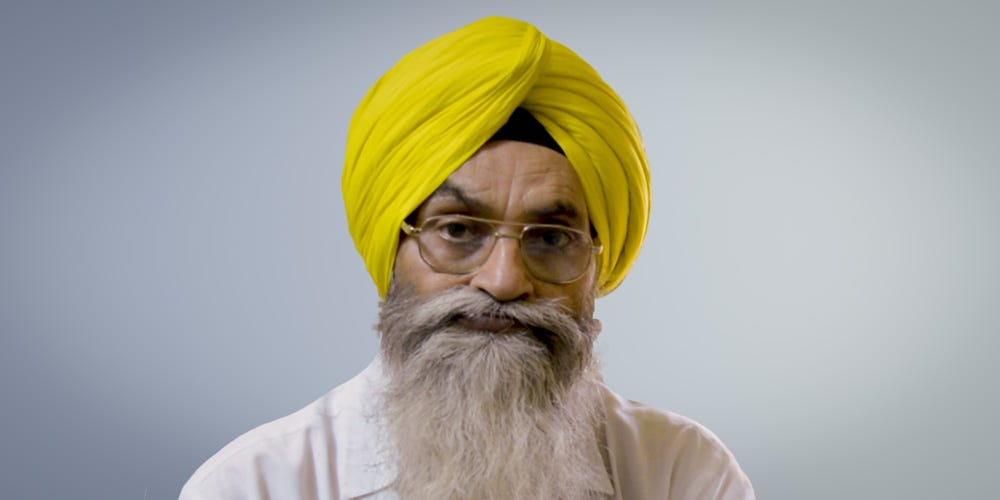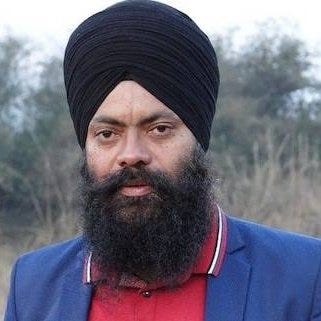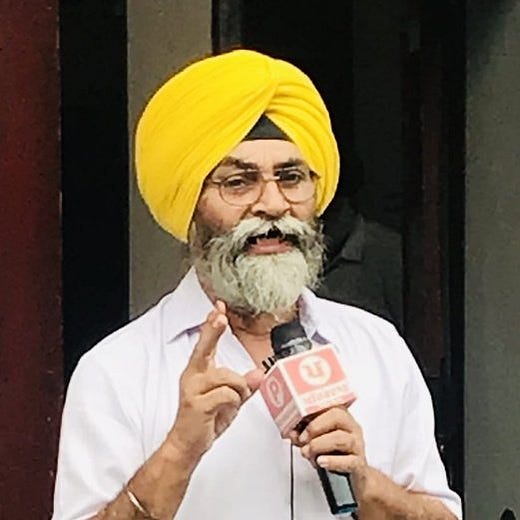Joti Kaur Rekhi: Pegasus Project Suggests Sikh Journalists Are Government Targets
“I had an idea that maybe the government had its eyes on my phone or my network, but I didn’t think it was on this scale. I never even dreamed it."
Joti Kaur Rekhi
July 26, 2021 | 5 min. read | Original Reporting
The phone number of a Ludhiana-based newspaper editor is among the more than 50,000 listed in a recently leaked document believed to include targets of spyware, Pegasus. Jaspal Singh Heran said he learned that his phone was infected with Pegasus software after a forensic investigation revealed his phone had been hacked in 2017.
The global spyware scandal continues to evolve, about a week after the findings were presented through a collaboration among 80 different journalists from more than 15 media outlets. The undertaking was spearheaded by Paris-based Forbidden Stories with forensic assistance from Amnesty International.
Heran, who is the editor of the Sikh-centric newspaper, Rozana Pehredar is among about 40 journalists based in India who are believed to have been potentially spied upon through the software created by Israel’s NSO group.
“I had an idea that maybe the government had its eyes on my phone or my network, but I didn’t think it was on this scale. I never even dreamed it,” said Heran.
The spyware gives complete access to an infected phone; not limited to: text messages, call history, contacts, photos, and GPS data. Calls on an infected phone can also be recorded. The hacking software allows for cameras to be turned on without the phone user ever knowing.
The software developer claims it only sells its “technologies solely to law enforcement and intelligence agencies of vetted governments” to aid with the prevention of terrorism and other crimes.
Indian government officials have neither affirmed nor denied its usage or purchase.
After widespread protests and a heated debate in Parliament, India’s new IT Minister, Ashwini Vaishnaw, who himself is believed to have been spied on, said that the Pegasus Project and reporting about it are “attempts to malign the Indian Democracy and its well-established institutions.” He further elaborated that a numbers’ presence on the list, does not necessarily mean that spyware software was indeed installed.
Heran said he was contacted by The Wire, an India-based independent media outlet that worked in a consortium on The Pegasus Project, about a month ago to inform him that his number was on the list.
“They asked me ‘Do you know that your phone may be tapped?’ And I said ‘No, I have no idea.’ They then asked me if they could examine my phone. I told them they can come check it anytime.”
Heran said a team came to his office to investigate his phone for about four to five hours and confirmed that it was infected by Pegasus.
However, the Forbidden Stories website indicates that while Heran was targetted and selected for surveillance through Pegasus in 2019, Amnesty International’s Security Lab did not find any traces of infection on his phone.
Forbidden Stories has not responded to multiple attempts through various means to clarify its statement.
“Each of the journalists believed to be spied on by Pegasus has written articles that are critical of the government,” said Heran. “The journalists who decide to write these types of articles basically have knife hanging over their heads and know that the government can do anything to them.”
According to Forbidden Stories, Heran became a target for potential surveillance many weeks after his publication reported on a campaign to free Sikh students who were sentenced to life in prison in 2019 for “possessing incriminating literature” and “waging war against the state.” They also add that “Sikh and other journalists have received threats for reporting on the 2020 farmers protests, including charges of sedition.”
However, Heran thinks the surveillance began much earlier than that. The newspaper editor said he believes his relationship with Bapu Surat Singh Khalsa, who has been undertaking a self-imposed fast since 2015 to demand the release of Sikh political prisoners, may have contributed to the Indian government taking interest in his work. He recalls arriving at a gurdwara for a bhog with Khalsa in 2015 to dozens of police officers.
Heran said his newspaper is critical of the government and pays particular attention to the undertakings of the Rashtriya Swayamsevak Sangh (RSS), the right-wing paramilitary arm of the ruling Hindu-Nationalist BJP.
“My newspaper puts a large focus and emphasis on Sikh values. Secondly, we intentionally publish content regarding actions taken by the RSS that are of importance to the Sikh community. We focus on these two things, so the 2022 election does not result in India becoming only a Hindu Rashtra (state).”
Heran believes the allegations further demonstrate the erosion of democracy in India. The country was downgraded to “Partly Free” status by the human rights NGO, Freedom House, in March. It was also downgraded that month to an “Electoral Autocracy” by the Varieties of Democracy (V-Dem), an independent research institute based out of the University of Gothenburg in Sweden.
“The ruling party we see in India is no longer a democracy. The two people running the country are PM Modi and Home Minister Amit Shah. Modi is running India like a dictator,” said Heran.
Rahul Gandhi, the leader of the opposing Congress party, said his number is on the leaked list of potential Pegasus targets. His request for a court inquiry into the allegations has been denied.
The Internet Freedom Foundation (IFF), a non-profit based in India, took to fact-checking statements made by government officials about the Pegasus scandal on Twitter. Its executive director, Apar Gupta, is disheartened by the lack of clarity in government statements and an independent inquiry investigating the allegations.
“The approach taken by the Indian government in repeating the defenses and the press statement by NSO on the floor of the parliament has been very disappointing. It’s been very unbecoming because it’s a private Israeli company, whose statement in defense is being taken over actual probable spyware infections of the top political establishment, constitutional functionaries, as well as journalists and activists,” said Gupta.
Gupta said the allegations, if found to be true, are dangerous for democratic freedom in India, including the electoral process. He believes the usage of spyware gives an unfair advantage to candidates running for reelection.
“Elections are not supposed to be merely votes at the ballot. They are also supposed to be entire processes of canvassing for votes. They are supposed to be free and fair, not by insertion of spyware which can extract information from another person’s smartphone.”
NSO Group shared its new Human Rights Policy in Sept. 2019, which it said are in alignment with the International Bill of Human Rights and UN Guiding Principals on Business and Human Rights.
In its policy, NSO Group explains part of the sales process, which includes the analysis of a potential client’s history on human rights and an evaluation of the possible misuse of its products. It further reads, NSO Group will “always investigate whenever we become aware of a well-founded report of alleged unlawful digital surveillance and communication interception that might involve a customer’s use of our products.”
NSO Group’s most recent statement, which was released on July 21, calls the Pegasus Project a “well-orchestrated media campaign….pushed by special interest groups.”
Gupta fears the normalization of the usage of spyware and says it has chilling implications for potential future usage.
“As the technology becomes more widespread, it becomes much cheaper. If we are normalizing the installation of spyware in one instance, it becomes the norm and people will do it much more often.”
Conversely, Heran said he has nothing to fear.
“If you’ve decided that you want to walk on the path of truth, then there will be obstacles. It could be argued that this path is even more challenging. So, I’m not afraid, but I was upset. It left me to wonder, what’s the reason to partner with such a big spyware company?”
Joti Kaur recently obtained her MSc in International Public Policy from UCL in London. Her research focused on the disappearances and extrajudicial executions that occurred in Punjab following the Sikh Genocide of 1984. Prior to returning to school, she worked as a local television reporter for five years. Advocating for others has always been at the core of her work. She remains a voice for the voiceless. You can find Joti on Twitter at @jotikrekhi
Baaz is home to opinions, ideas, and original reporting for the Sikh and Punjabi diaspora. Support us by subscribing. Find us on Twitter, Instagram, and Facebook at @BaazNewsOrg. If you would like to submit a written piece for consideration please email us at editor@baaznews.org.






